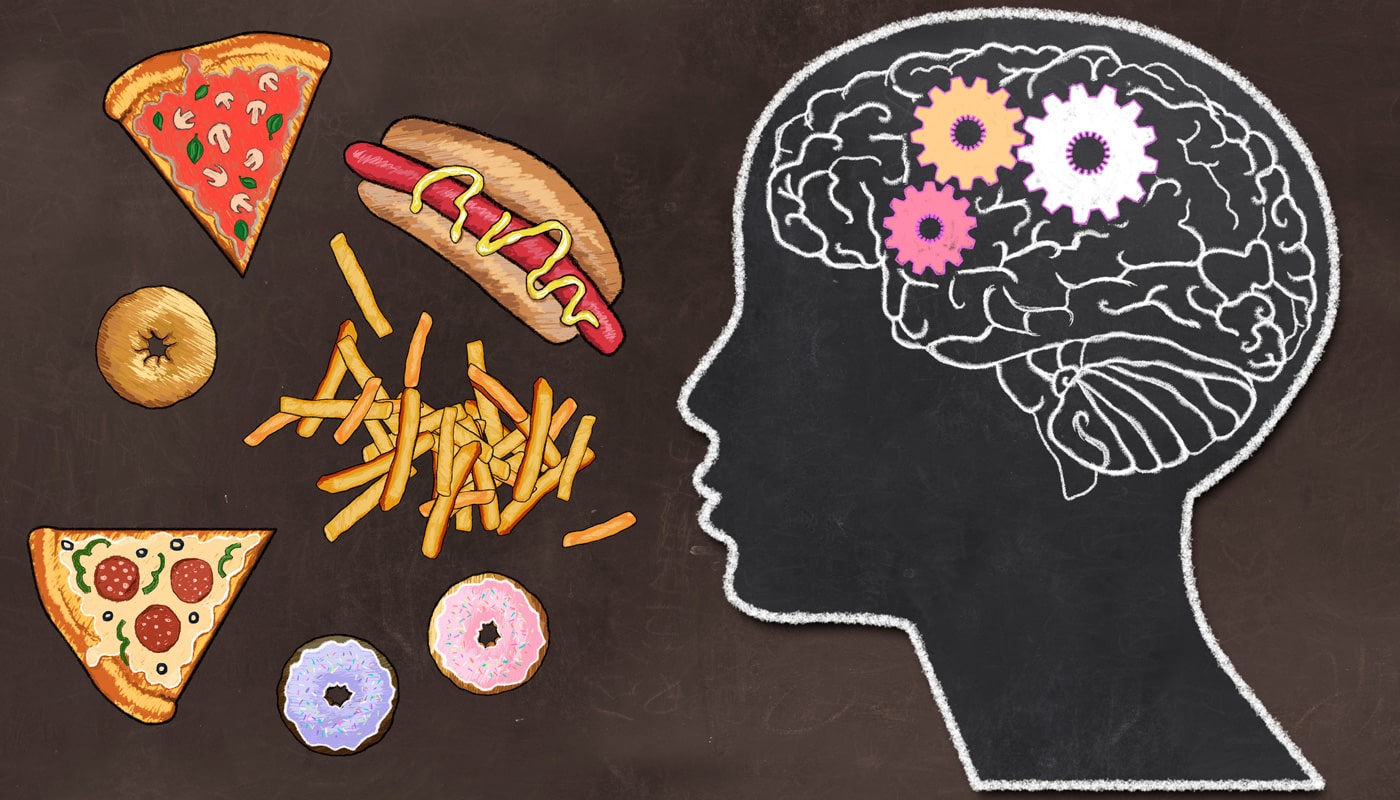Binge eating is an illness, a serious mental and eating disorder that is little discussed, but fortunately there is treatment.
Anyone who has never overindulged in food should cast the first stone. This is completely normal, whether it’s a birthday party, a wedding or a special occasion that you take advantage of to eat a little more. In these cases, there may be someone who says that it is an episode of binge eating, perhaps it is. The problem is when these episodes become more and more common. That’s why it’s so important to understand what binge eating is.
Binge eating is a disease where the individual has an intense need to eat, even when they are not hungry, or when they are already full. It is only considered binge eating when this behavior is frequent and begins to affect the person’s health and well-being. In other words, when she loses control over her diet and finds in food a kind of outlet to alleviate distressing feelings.
However, despite being talked about a lot, it is still a disease that is not very clear to the vast majority of people, who confuse binge eating with overeating from time to time. Therefore, today we will talk about this subject and understand exactly what binge eating is.
What is binge eating?

Many obese people say they suffer from binge eating, however many of them do not necessarily have the disease. Although food compulsion is related to obesity, not all obese people are compulsive eaters. Hence the need to understand what binge eating is and its causes.
It is a mental and eating disorder, in which there is an extreme need to eat, whether hungry or not, whether satisfied or not, the person continues to eat. Therefore, people suffering from the disease eat large amounts of food in a short period of time, generally high-calorie, fatty and processed foods.
So, over time, she loses control, and starts eating simply for the sake of eating, without any idea of what she is eating or how much, even without pleasure or desire. And this begins to directly affect the individual’s physical and mental health.
Causes of binge eating

As for what causes binge eating, we can mention some factors that contribute to a greater or lesser extent to the loss of control over food.
Restrictive diets
The first and most common are restrictive diets, which considerably increase a person’s risk of developing binge eating. This is because these diets deprive people of many foods and end up leaving people sad and depressed. Thus, increasing people’s desire for these foods that they should not eat.
Food and emotional comfort
Who has never, after a very tiring day at work, wanted to treat themselves by eating their favorite food? Or, after a disappointment in love, did you drown your sorrows in a whole tub of ice cream? These are common behaviors, but they can generate a certain dependence on these foods to feel better.
Several studies have already shown that people who eat compulsively often experience emotional changes as a trigger. In other words, they find emotional comfort and relief in food. In fact, stress is one of the most common causes of the disorder, because compulsion can be a way for a person to deal with stress.
Disgust with one’s own body image
Most people with binge eating do not like their physical appearance. And because of this, they have the idea that they should eat less. In this way, they tend to compensate for weight gain with crazy and very restrictive diets, stopping eating completely, taking weight loss pills, etc. All of this could end up having the opposite effect, and causing many other worse problems.
Binge eating causes emotional problems
In cases where binge eating is accompanied by other problematic practices, such as vomiting after eating or taking laxatives, they may be related to more serious problems. Such as past traumas, such as sexual abuse, neglect, among others.
Symptoms of binge eating

So, when a person starts eating more frequently, often more than necessary or in short intervals between meals, it is an indication that something is not right. Therefore, let’s see below the main symptoms of a person with binge eating:
- The person eats very quickly, faster than normal;
- Eat even if you are not hungry;
- Continue eating after you are satisfied;
- The person eats larger amounts of food than necessary;
- Cultivates the habit of eating hidden from other people;
- Eating foods considered “strange” and unusual;
- Tends to feel sad and guilty after eating a lot;
- Displays introverted behavior after meals;
- You may have emotional problems and addictions to gambling, etc.
Main risks of binge eating

Considering that food is a fundamental part of an individual’s health and well-being, binge eating can increase a person’s risk of developing some serious illnesses, such as:
- Obesity;
- Kidney stones;
- Respiratory failure;
- Heart failure and vascular problems;
- Sleep apnea;
- Type 2 diabetes;
- Hypertension,
- High cholesterol;
- Gastritis;
- Bulimia or anorexia
- Depression;
- OCD (obsessive compulsive disorder).
Treatment of binge eating

It is a delicate and quite complex disease, and like any pathology it requires professional treatment and monitoring. Like other eating disorders, the treatment of binge eating must be done in a multidisciplinary way. In other words, the patient must have direct monitoring with a doctor, a psychologist and a nutritionist.
In this way, the doctor will advise the patient about the disease, and prescribe medication, when necessary, such as medication for anxiety. However, it is very important to emphasize that treatment does not just consist of the use of medication.
Another fundamental part is working on the patient’s mind, to understand what leads to compulsion, and thus increase their awareness of themselves and their needs. Hence the need for psychological support. The psychologist’s joint work with the patient should lead to a better understanding of all the anxiety triggers that lead to compulsion and thus finding control strategies.
So, working with the mind, the patient will need a dietary plan specific to their needs and particularities. At this stage, the work of the nutritionist comes into play, who together with the patient will prepare a balanced diet rich in all the nutrients necessary to control binge eating.
Along with all this, it is also recommended to practice physical exercises and activities focused on attention and relaxation, such as meditation and yoga, for example. Physical activity, in addition to keeping the body healthy and moving, will contribute to the production of endorphins and control anxiety.
Tips on how to prevent and reduce the symptoms of binge eating

So, now that we know what binge eating is, let’s look at some tips to control, prevent and reduce symptoms:
1 – Understand your motivation
Understanding what makes you binge eat is a great way to start dealing with it. So, the next time you feel like attacking the fridge, identify what you’re feeling.
2 – Avoid restrictive diets
Going for long periods without eating, drastically reducing the amount of food, imposing restrictions on certain foods is not the best way to deal with compulsion. Quite the contrary, as previously stated, it is even one of the causes of developing this disorder and increasing binge episodes.
Furthermore, the exclusion of certain food groups, such as carbohydrates, for example, unbalances the diet and increases hunger, and does not have a lasting effect. So, avoid these diets.
3 – Don’t skip meals
Ideally, someone who suffers from binge eating should have pre-determined times for eating meals. This is because skipping meals increases the risk of overeating the next time you eat. Therefore, the recommendation is to have three main meals a day, and healthy snacks in between. But an addendum, wait until you are hungry to eat. The rule of eating every 3 hours doesn’t always work for everyone.
4 – Drink lots of water

Drinking lots of water is a fundamental tip and works for absolutely everything. In addition to staying hydrated, drinking water is a great way to control hunger and the desire to eat. This is because it is a strategy to alleviate the feeling of emptiness that a compulsive person may feel.
5 – Invest in a diet rich in fiber
Eating more fiber-rich foods is a great way to alleviate the symptoms of binge eating. This is because fiber intake increases satiety, reduces the desire to eat, hunger and the amount of food consumed. So, invest in a diet rich in fruits, vegetables and whole grains that are sources of fiber.
6 – Avoid storing foods considered unhealthy
Sweets, industrialized, ultra-processed, are just some of the foods considered unhealthy. So, to avoid temptation and resort to these foods in excess, avoid buying them and having them at home. Instead, always have healthy foods available.
7 – Sleep well
Sleep has a great influence on our health, proof of this is that sleeping a few hours or sleeping poorly causes several hormonal changes in our body, which can increase hunger. Furthermore, sleeping well helps improve nighttime anxiety and alleviate symptoms of binge eating.
8 – Practice of physical activities

Including regular physical activity in your routine can greatly help control the symptoms of binge eating and help you lose weight. In addition to increasing the feeling of pleasure and well-being due to the release of endorphins in the body, sensations that many people seek from food. So, change the source of your pleasure, find an activity that is pleasurable and fun and enjoy it.
9 – Plan meals
Planning and organization are great allies in dealing with binge eating. In addition to being a way to control portion size and improve the quality of your diet, it also reduces the risk of an episode of binge eating.
10 – Eat slowly
Eating quickly is one of the main symptoms of compulsive people. This way, they barely even chew their food, missing the opportunity to taste and enjoy the meal. Therefore, eating slowly, in addition to being a much more pleasurable habit, also helps to increase the feeling of satiety and reduces the risk of eating on impulse. Furthermore, it improves digestion and prevents the person from becoming stuffed due to overeating.
Anyway, what did you think of this article? In fact, take the opportunity to also check out Eating well – Tips for healthy and tasty eating at the right point.
Sources: Psychology Viva Vittude Viva Bem Tua Saúde
Images: Lívia Raimundo VIX Neuro Teen Ana Maria Psychologist and Therapy Correio do Povo do Paraná Super Gentil Segredos do Mundo SESI

Sign up for our newsletter and stay up to date with exclusive news
that can transform your routine!
Warning: Undefined array key "title" in /home/storelat/public_html/wp-content/plugins/link-whisper-premium/templates/frontend/related-posts.php on line 12
Warning: Undefined array key "title_tag" in /home/storelat/public_html/wp-content/plugins/link-whisper-premium/templates/frontend/related-posts.php on line 13




